| Listing 1 - 10 of 15 | << page >> |
Sort by
|
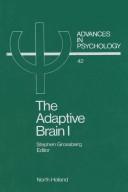
ISBN: 0444701192 0444701176 0444701184 9786611797874 1281797871 0080866964 9786611797881 128179788X 0080866972 9780080866963 9780444701176 9780080866970 9780444701183 9780444704146 0444704140 Year: 1987 Volume: 42, 43 Publisher: Amsterdam ; New York : New York, N.Y., U.S.A. : North-Holland ; Sole distributors for the U.S.A. and Canada, Elsevier Science Pub. Co.,
Abstract | Keywords | Export | Availability | Bookmark
 Loading...
Loading...Choose an application
- Reference Manager
- EndNote
- RefWorks (Direct export to RefWorks)
THE ADAPTIVE BRAIN II
Cognitive psychology --- Neuropathology --- Affective and dynamic functions --- Neuropsychology --- Brain --- Cognition --- Higher nervous activity --- Circadian Rhythms --- Mental Processes --- Neuropsychologie --- Cerveau --- Activité nerveuse supérieure --- Adaptation --- Physiology --- physiology --- -Cognition --- #TELE:d.d. Prof. A. J. J. Oosterlinck --- Neurophysiology --- Psychophysiology --- Cortical function, Higher --- Nervous activity, Higher --- Psychology --- Cerebrum --- Mind --- Central nervous system --- Head --- Cognition. --- Higher nervous activity. --- Neuropsychology. --- Circadian rhythm. --- Adaptation. --- physiology. --- Circadian Rhythm. --- Activité nerveuse supérieure --- Physiology.
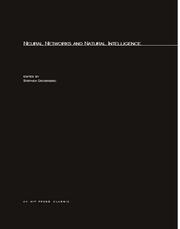
ISBN: 026207107X 0262315939 9780262315937 9780262071079 0262570912 9780262570916 Year: 1988 Publisher: Cambridge (Mass.) : MIT press,
Abstract | Keywords | Export | Availability | Bookmark
 Loading...
Loading...Choose an application
- Reference Manager
- EndNote
- RefWorks (Direct export to RefWorks)
Stephen Grossberg and his colleagues at Boston University's Center for Adaptive Systems are producing some of the most exciting research in the neural network approach to making computers "think." Packed with real-time computer simulations and rigorous demonstrations of these phenomena, this book includes results on vision, speech, cognitive information processing; adaptive pattern recognition, adaptive robotics, conditioning and attention, cognitive-emotional interactions, and decision making under risk.
AI(Artificial intelligence) --- Circuitry [Neural ] --- Circuits [Neural ] --- Human intelligence --- Intelligence [Artificial ] --- Nerveux [Réseau ] --- Net [Zenuw] --- Neurale computers --- Ordinateurs neuraux --- Réseau nerveux --- Thinking [Artificial ] --- Verstand --- Zenuwnet --- Ordinateurs neuronaux --- Synaptic Transmission. --- Transmission, Neural --- Transmission, Synaptic --- Neural Transmission --- Neurotransmission --- Neural Conduction --- Synapses --- Neurale netwerken --- Intelligentie. --- Cerveaux électroniques --- Machines intelligentes --- Pensée artificielle --- Intelligence --- Artificial intelligence --- Intellect. --- Neural computers --- Neural networks (Computer science) --- Neural circuitry --- Intelligence artificielle --- Réseaux neuronaux (Informatique) --- Réseaux nerveux --- Intellect --- Synaptic Transmission --- #TELE:SISTA --- Artificial neural networks --- Nets, Neural (Computer science) --- Networks, Neural (Computer science) --- Neural nets (Computer science) --- Natural computation --- Soft computing --- Mind --- Ability --- Psychology --- Thought and thinking --- AI (Artificial intelligence) --- Artificial thinking --- Electronic brains --- Intellectronics --- Intelligence, Artificial --- Intelligent machines --- Machine intelligence --- Thinking, Artificial --- Bionics --- Cognitive science --- Digital computer simulation --- Electronic data processing --- Logic machines --- Machine theory --- Self-organizing systems --- Simulation methods --- Fifth generation computers --- Neural net computers --- Neural network computers --- Neurocomputers --- Electronic digital computers --- Cognitive psychology --- Artificial intelligence. Robotics. Simulation. Graphics --- Computer architecture. Operating systems --- Artificial intelligence. --- Neural computers. --- Neural networks (Computer science). --- Geheugen. --- Neurale netwerken. --- Intelligence. --- Réseaux neuronaux (physiologie) --- Apprentissage automatique. --- Sciences cognitives. --- Neural networks (Neurobiology) --- Machine learning --- Brain. --- Cerebrum --- Central nervous system --- Head --- Computer systems compared with --- human brain --- Man --- Brain compared with --- computer systems --- COGNITIVE SCIENCES/General --- COMPUTER SCIENCE/Machine Learning & Neural Networks --- Réseaux neuronaux (physiologie)
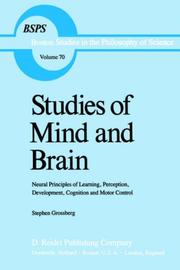
ISBN: 9027713596 Year: 1982 Publisher: Dordrecht
Abstract | Keywords | Export | Availability | Bookmark
 Loading...
Loading...Choose an application
- Reference Manager
- EndNote
- RefWorks (Direct export to RefWorks)
Learning --- Memory --- Mind and body --- Neural networks (Neurobiology) --- Neuropsychology --- 612.8 --- Neurophysiology --- Psychophysiology --- Biological neural networks --- Nets, Neural (Neurobiology) --- Networks, Neural (Neurobiology) --- Neural nets (Neurobiology) --- Cognitive neuroscience --- Neurobiology --- Neural circuitry --- Body and mind --- Body and soul (Philosophy) --- Human body --- Mind --- Mind-body connection --- Mind-body relations --- Mind-cure --- Somatopsychics --- Brain --- Dualism --- Philosophical anthropology --- Holistic medicine --- Mental healing --- Parousia (Philosophy) --- Phrenology --- Self --- Retention (Psychology) --- Intellect --- Psychology --- Thought and thinking --- Comprehension --- Executive functions (Neuropsychology) --- Mnemonics --- Perseveration (Psychology) --- Reproduction (Psychology) --- Physiological aspects --- Zenuwstelsel. Zintuigen. Motorische neurowetenschappen --- Psychological aspects --- Cognitive psychology
Book
ISBN: 0190070552 9780190070557 Year: 2021 Publisher: New York : Oxford University Press,
Abstract | Keywords | Export | Availability | Bookmark
 Loading...
Loading...Choose an application
- Reference Manager
- EndNote
- RefWorks (Direct export to RefWorks)
Because brains embody a universal developmental code, unifying insights also emerge about shared laws that are found in all living cellular tissues, from the most primitive to the most advanced, notably how the laws governing networks of interacting cells support developmental and learning processes in all species. The fundamental brain design principles of complementarity, uncertainty, and resonance that Grossberg has discovered also reflect laws of the physical world with which our brains ceaselessly interact, and which enable our brains to incrementally learn to understand those laws, thereby enabling humans to understand the world scientifically. Accessibly written, and lavishly illustrated, Conscious Mind/Resonant Brain is the magnum opus of one of the most influential scientists of the past 50 years, and will appeal to a broad readership across the sciences and humanities. How does your mind work? How does your brain give rise to your mind? These are questions that all of us have wondered about at some point in our lives, if only because everything that we know is experienced in our minds. They are also very hard questions to answer. After all, how can a mind understand itself? How can you understand something as complex as the tool that is being used to understand it? This book provides an introductory and self-contained description of some of the exciting answers to these questions that modern theories of mind and brain have recently proposed. Stephen Grossberg is broadly acknowledged to be the most important pioneer and current research leader who has, for the past 50 years, modelled how brains give rise to minds, notably how neural circuits in multiple brain regions interact together to generate psychological functions. This research has led to a unified understanding of how, where, and why our brains can consciously see, hear, feel, and know about the world, and effectively plan and act within it. The work embodies revolutionary Principia of Mind that clarify how autonomous adaptive intelligence is achieved. It provides mechanistic explanations of multiple mental disorders, including symptoms of Alzheimer's disease, autism, amnesia, and sleep disorders; biological bases of morality and religion, including why our brains are biased towards the good so that values are not purely relative; perplexing aspects of the human condition, including why many decisions are irrational and self-defeating despite evolution's selection of adaptive behaviors; and solutions to large-scale problems in machine learning, technology, and Artificial Intelligence that provide a blueprint for autonomously intelligent algorithms and robots.
Brain. --- Cognition. --- Conscience. --- Consciousness. --- cognition.
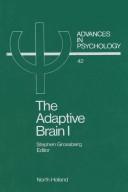
ISBN: 9780080866963 0080866964 9780444701176 0444701176 Year: 1987 Publisher: New York North-Holland
Abstract | Keywords | Export | Availability | Bookmark
 Loading...
Loading...Choose an application
- Reference Manager
- EndNote
- RefWorks (Direct export to RefWorks)
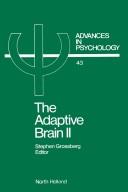
ISBN: 9780080866970 0080866972 9780444701183 0444701184 Year: 1987 Publisher: New York North-Holland
Abstract | Keywords | Export | Availability | Bookmark
 Loading...
Loading...Choose an application
- Reference Manager
- EndNote
- RefWorks (Direct export to RefWorks)
THE ADAPTIVE BRAIN II.
Book
Year: 1981 Publisher: Providence American Mathematical Society
Abstract | Keywords | Export | Availability | Bookmark
 Loading...
Loading...Choose an application
- Reference Manager
- EndNote
- RefWorks (Direct export to RefWorks)
Book
Year: 1982 Publisher: Dordrecht, Boston, London Reidel
Abstract | Keywords | Export | Availability | Bookmark
 Loading...
Loading...Choose an application
- Reference Manager
- EndNote
- RefWorks (Direct export to RefWorks)
Book
ISBN: 0190070579 0190070587 0190070560 Year: 2021 Publisher: New York, New York : Oxford University Press,
Abstract | Keywords | Export | Availability | Bookmark
 Loading...
Loading...Choose an application
- Reference Manager
- EndNote
- RefWorks (Direct export to RefWorks)
¿Cómo funciona tu mente? ¿Cómo tu cerebro da lugar a su mente? Estas son preguntas sobre las que todos nos hemos preguntado en algún momento de nuestras vidas, aunque solo sea porque todo lo que sabemos se experimenta en nuestra mente. También son preguntas muy difíciles de responder. Después de todo, ¿cómo puede una mente comprenderse a sí misma? ¿Cómo se puede entender algo tan complejo como la herramienta que se utiliza para comprenderlo? Este libro proporciona una descripción introductoria y autónoma de algunas de las interesantes respuestas a estas preguntas que las teorías modernas de la mente y el cerebro han propuesto recientemente. Stephen Grossberg es ampliamente reconocido como el pionero más importante y líder de investigación actual que, durante los últimos 50 años, ha modelado cómo los cerebros dan lugar a las mentes, en particular cómo los circuitos neuronales en múltiples regiones del cerebro interactúan juntos para generar funciones psicológicas. Esta investigación ha llevado a una comprensión unificada de cómo, dónde y por qué nuestro cerebro puede ver, oír, sentir y conocer conscientemente sobre el mundo, y planificar y actuar de manera eficaz dentro de él.
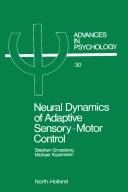
ISBN: 0444879293 9786611788469 1281788465 0080866840 9780080866840 9780444879295 9781281788467 6611788468 Year: 1986 Volume: 30 Publisher: Amsterdam ; New York : New York, N.Y., U.S.A. : North-Holland ; Sole distributors for the U.S.A. and Canada, Elsevier Science Pub. Co.,
Abstract | Keywords | Export | Availability | Bookmark
 Loading...
Loading...Choose an application
- Reference Manager
- EndNote
- RefWorks (Direct export to RefWorks)
NEURAL DYNAMICS OF ADAPTIVE SENSORY-MOTOR CONTROL
Saccadic eye movements --- Sensorimotor integration --- Neural networks (Neurobiology) --- Neuroophthalmology --- Eye Movements. --- Psychomotor Disorders. --- Integration, Sensorimotor --- Intersensory integration --- Perceptual-motor integration --- Sensimotor integration --- Sensory integration --- Sensory-motor integration --- Perceptual-motor processes --- Sensory integration dysfunction --- Eye movements, Saccadic --- Saccades (Ophthalmology) --- Eye --- Neuro-ophthalmology --- Neurology --- Ophthalmology --- Biological neural networks --- Nets, Neural (Neurobiology) --- Networks, Neural (Neurobiology) --- Neural nets (Neurobiology) --- Cognitive neuroscience --- Neurobiology --- Neural circuitry --- Developmental Psychomotor Disorders --- Psychomotor Disorders, Developmental --- Psychomotor Impairment --- Developmental Psychomotor Disorder --- Impairment, Psychomotor --- Impairments, Psychomotor --- Psychomotor Disorder, Developmental --- Psychomotor Impairments --- Movement Disorders --- Eye Movement --- Movement, Eye --- Movements, Eye --- Eye Movement Measurements --- Movements --- Eye Movements --- Psychomotor Disorders --- Saccadic eye movements. --- Sensorimotor integration. --- Neuroophthalmology.
| Listing 1 - 10 of 15 | << page >> |
Sort by
|

 Search
Search Feedback
Feedback About UniCat
About UniCat  Help
Help News
News